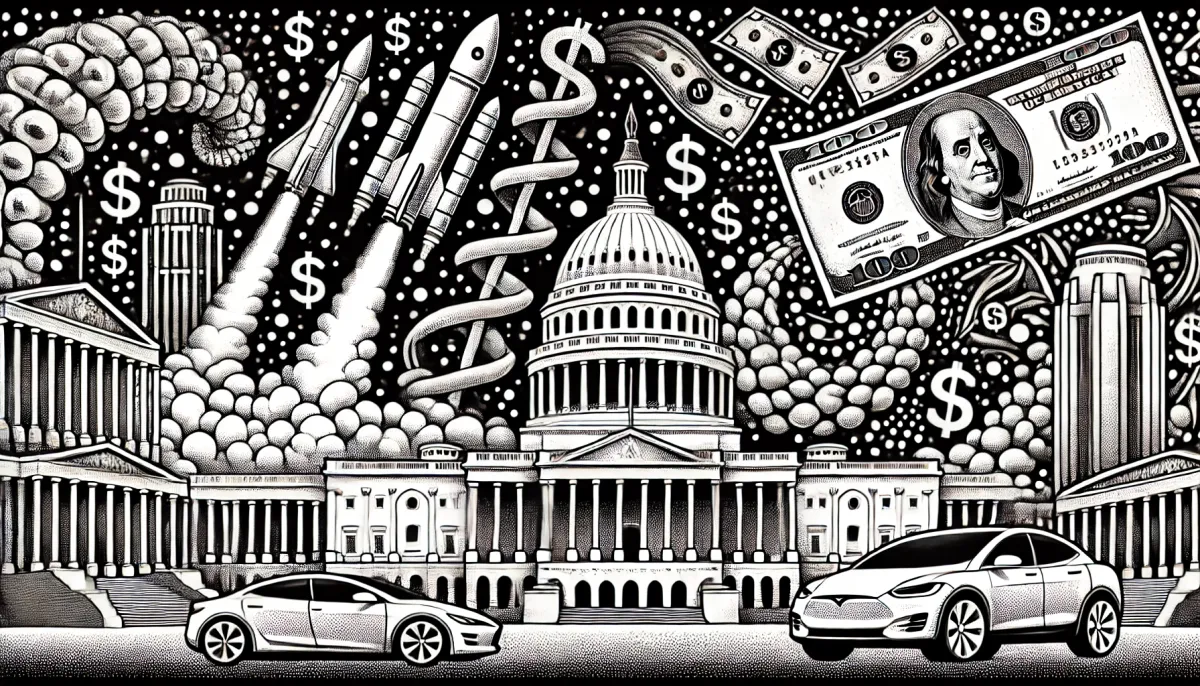Elon Musk, $38 Billion in Government Support—and the Politicians Who Helped Make It Happen

Few figures in American capitalism embody the fusion of public funding and private ambition quite like Elon Musk. According to a 2025 Washington Post investigation, Musk’s companies—Tesla and SpaceX—have received at least $38 billion in government support. But that number alone tells only half the story.
The real question is: Who enabled this?
From EV tax credits in the Inflation Reduction Act to billion-dollar NASA contracts, a bipartisan policy landscape has quietly supercharged Musk’s empire. And behind those policies? A very specific list of politicians—some who vocally oppose subsidies in principle but voted for them in practice.
Let’s unpack the money, the lawmakers, and the growing controversy around America’s most publicly funded private entrepreneur.
📦 Musk's $38 Billion: Where the Money Came From
The Washington Post analysis revealed Musk’s companies have been beneficiaries of a government spending arc that spans two decades, across both Republican and Democratic administrations.
| Company | Funding Source | Amount (USD) |
|---|---|---|
| Tesla | Regulatory credits, DOE loan, state/local subsidies | $11.4B+ |
| SpaceX | NASA and DoD contracts | $22.5B+ |
| Total | All government sources | $38.0B+ |
But how does that money get approved? Enter the Inflation Reduction Act of 2022, a turning point in Tesla's trajectory—and a political Rorschach test.
🏛️ The Political Engine Behind Tesla’s Billions
The Inflation Reduction Act (IRA)—championed by Senators Chuck Schumer (D-NY) and Joe Manchin (D-WV)—unlocked $7,500 tax credits for electric vehicles. While designed to boost climate action, the structure of the credits meant Tesla was among the biggest corporate winners.
The bill passed without a single Republican vote. Every Democrat in Congress backed it, making Musk’s windfall a uniquely blue-aligned subsidy—despite his increasingly hostile posture toward the Democratic Party.
⚡️ Tesla praised the IRA in official comments to the Treasury and IRS, lobbying to ensure maximum eligibility under the law.
Notable Democratic Enablers:
- Chuck Schumer (D-NY): Senate Majority Leader, IRA co-sponsor.
- Joe Manchin (D-WV): Swing vote, negotiated terms.
- Nancy Pelosi (D-CA): Speaker of the House at the time, marshaled Democratic unity.
- Steny Hoyer (D-MD): House Majority Leader, supported legislative passage.
- Kamala Harris: Received $107,606 in campaign contributions from individuals tied to Tesla.
🚀 SpaceX and the NASA Nexus
While Tesla’s federal benefit structure is public-facing, SpaceX’s windfall is more behind the curtain. Since 2015, SpaceX has won over $17 billion in NASA contracts, a figure that doubled under the Biden administration.
Though there’s less personal political affiliation here, this windfall reflects strong bipartisan support for space funding, especially from:
- Senate Commerce, Science, and Transportation Committee
- House Science, Space, and Technology Committee
These bodies regularly approve NASA budgets and defense allocations, including those that fuel SpaceX’s moon lander, satellite launches, and national security missions.
🧮 The Financial Paper Trail: Tesla's Political Contributions
According to OpenSecrets, individuals tied to Tesla have made notable political contributions. Here's a snapshot:
| Recipient | Amount Received | Party |
|---|---|---|
| Kamala Harris | $107,606 | Democrat |
| Donald Trump | $38,476 | Republican |
| Robert F. Kennedy Jr. | $6,365 | Independent |
| Lanon Baccam | $4,300 | Democrat |
These contributions don’t always reflect company policy, but they suggest alignment—especially when the top recipient is the sitting Vice President who championed the IRA.
🏙️ State-Level Sweeteners
Let’s not forget the state play. Musk has expertly tapped local incentive packages to lower operational costs:
- Nevada: $1.6 billion for Tesla’s Gigafactory
- New York: $750 million related to the now-absorbed SolarCity
- California: At least $1.5 billion since 2007
These often go unnoticed in national narratives, but they’re critical in building the infrastructure that powers Tesla's scale.
🤯 Musk’s Contradiction: Anti-Subsidy, Pro-Lobbying?
Despite the billions in backing, Musk has famously criticized government handouts:
“I’m against subsidies,” Musk said—right after repaying a $465 million DOE loan in 2013.
But behind the scenes? Tesla continues to lobby for benefits and push for favorable interpretations of legislation like the IRA. This public-private duality raises questions about whether Musk's brand of libertarianism is performance or principle.
🧠 Strategic Takeaways for Policymakers & Investors
- Follow the legislation, not the headlines. The IRA, CHIPS Act, and NASA budgets tell you more about corporate winners than public speeches ever will.
- State and local governments are kingmakers. Nevada’s Gigafactory bet paid off big—others are replicating that playbook.
- Musk’s empire is a case study in public-private synergy. From regulatory credits to space contracts, his success is as much political as it is technological.
📌 Conclusion: Musk Didn’t Do It Alone
Elon Musk may be the face of modern innovation, but the $38 billion backing his ventures is deeply political. Laws like the Inflation Reduction Act and ongoing NASA funding don’t materialize from thin air—they’re championed, funded, and defended by elected officials.
So while Musk presents himself as an anti-establishment iconoclast, the data tells a more complex story: his rise has been powered, in no small part, by the very political machinery he often rails against.
🤔 What Do You Think?
- Should federal contracts and EV credits be considered “subsidies”?
- Do politicians like Schumer, Manchin, or Harris deserve credit—or scrutiny—for backing Musk’s rise?
- How should we define “self-made” in a world where trillion-dollar companies are scaffolded by public money?
Drop your thoughts in the comments. This isn’t just about Elon—it’s about the future of public investment in private innovation.




Comments ()